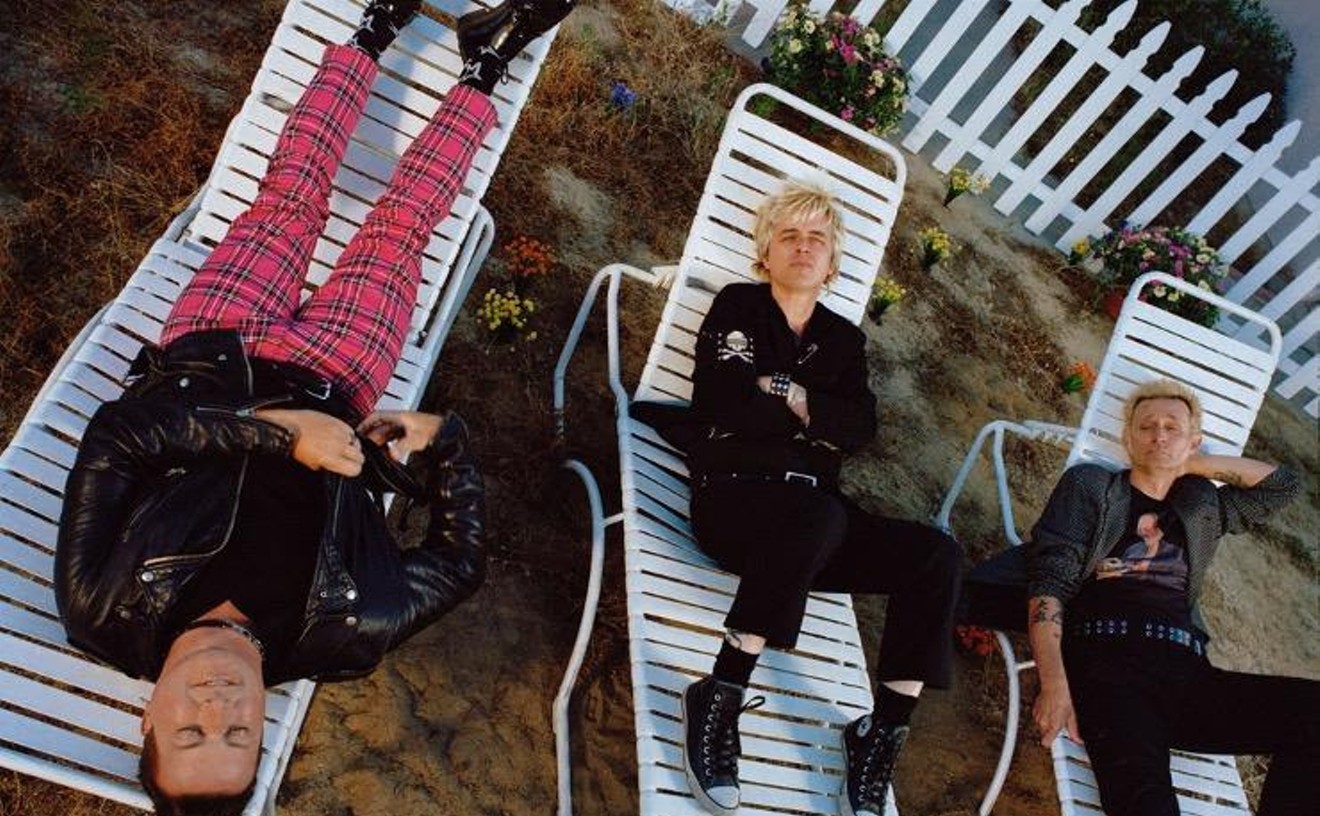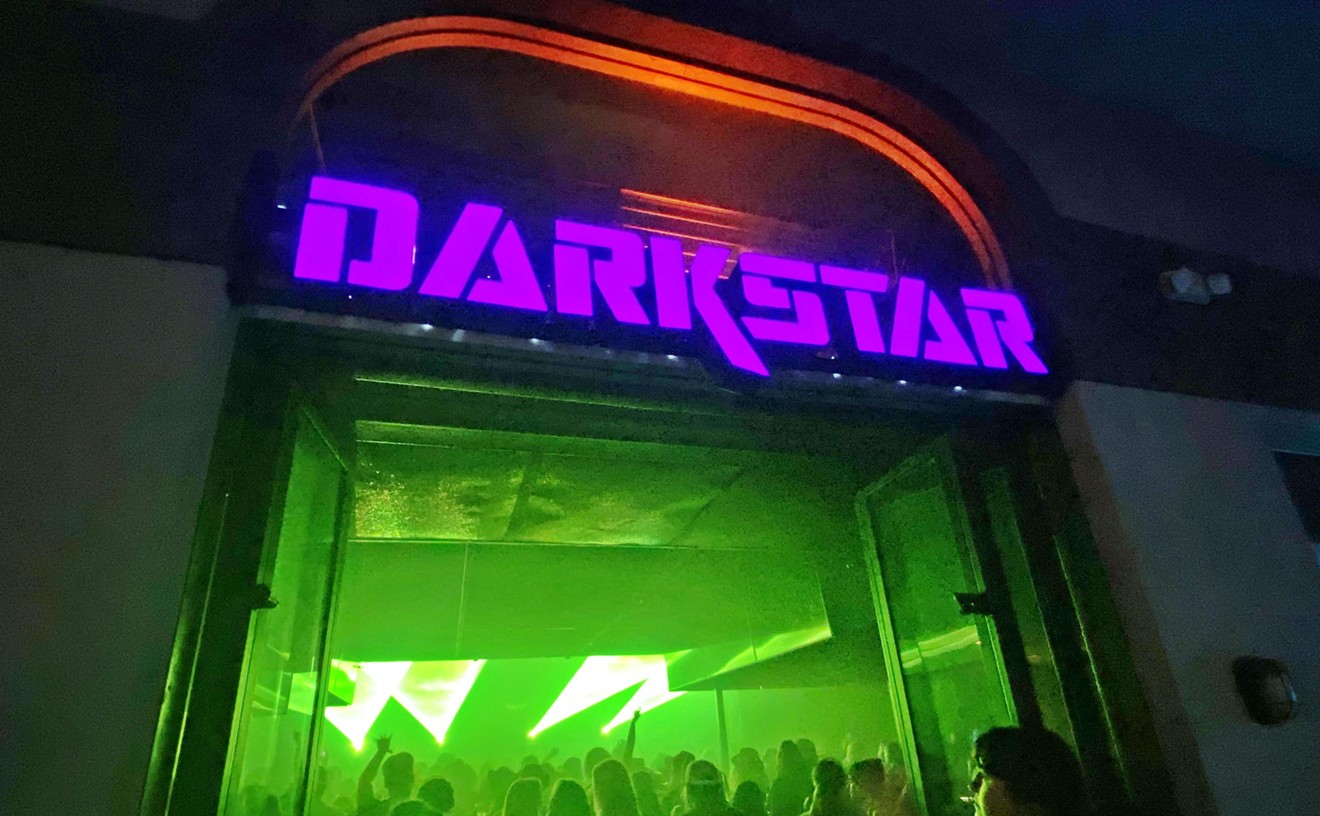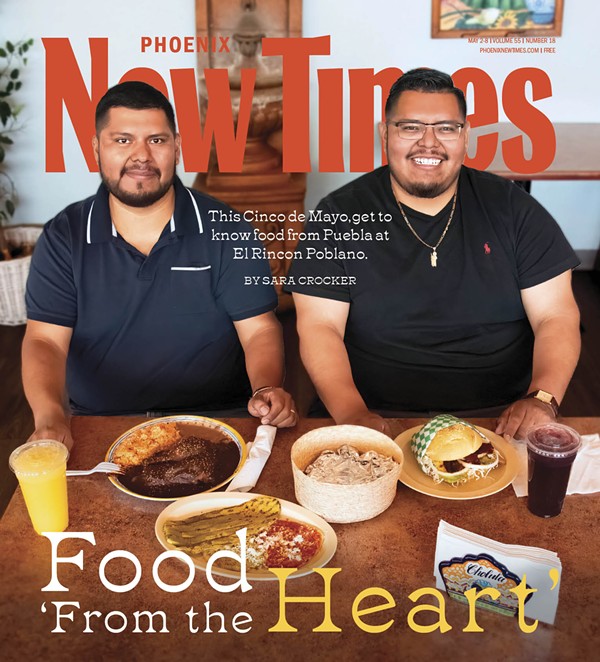It's early on a Friday night, and I'm saddled up at the bar at Palo Verde Lounge in Tempe, waiting for the six members of blackened rock 'n' roll sextet TOAD (it's an acronym: Take Over and Destroy) to show up for an interview. The "Dirty Verde" is notoriously small, but I glance around wondering whether one of the six or seven folks in the place is a member of the band. The guy to my left is fashioning a lime into a pipe, and the two gentlemen to my right are discussing shooting things with rifles.
Interesting, but not the guys I'm looking for.
When the six 20-somethings walk into the bar, I realize how ridiculous the notion that I could have missed them is. TOAD looks unmistakably like a band: all sleeveless denim, tight black jeans, leather jackets, and metal band logo patches. They're regulars here, too, I realize as guitarist Alex Rollins and bassist Trey Edwin order up pitchers of Coors, and the other members of the band — vocalist Andrew Leemont, drummer Shane Taylor, organist Pete Porter, and guitarist Nate Garrett — grab a table near the bar's lineup of arcade machines.
Someone puts The Stooges on the jukebox, and the gutbucket guitars of Ron Asheton make our conversation about TOAD's new record, Rotten Tide, feel natural. The five-song EP undeniably is the work of a metal band, taking cues from the shredded vocals and eerie atmospherics of black metal, the harmonized guitars of classic '70s and '80s bands, and the crunchy heft of doom metal, but what's most curious about the record is its rock 'n' roll vibe: Opening song "Midnight Hunger" swings and stomps with Thin Lizzy-like swagger, and "Embody the Ghost" borrows vintage punk's vitriol before slowing down into a psychedelic swirl.
The band made the record at Flying Blanket Studios in Mesa, with producer Bob Hoag. Though Hoag is known more for recording indie rock acts like Gospel Claws, Sister Cities, and Kinch, he's got heavier bona fides, too: He produced Slut Sister, TOAD's sludgier precursor, and The Bled, a Tucson hardcore band that influenced the members of TOAD at an impressionable age.
"We saw The Bled back at the old Nile," says Edwin, laughing. "I went up to the merch booth and was, like, 'Can I have a copy of that EP?' [A member] said, 'I bet if you ask everyone here for a dollar, you'll have enough for the EP.' I made enough to buy it. I still have it."
"Bob's the man," Rollins says. "He has to give it his own feel, because he's not a strict metal producer or metal engineer. I played a vintage Telecaster, [and] I used a Fender Bassman [amplifier] to get the chugs really thick. I went into M-Tronics and was looking at one, and the guy was like, 'Why are you trying to play metal out of that,' and I'm, like, 'Are you kidding me, motherfucker?'"
The record was recorded to analog tape, and the sounds have vintage warmth. Rather than use modern amps and distortion pedals, Rollins and former guitarist Dan Labarbera (replaced by Garrett when Labarbera left to join the Army) maxed out the tubes on a variety of Flying Blanket's in-house amps. The band played together live in the studio's main room to achieve the interplay of a live set. The band recorded two to three takes of each song, but went with the first take in most instances. "We kind of left the flaws in there for a reason," says Bollins. "We wanted to make a record that had that horror movie feel and kind of a B-movie element."
Leemont recorded his vocals over the live tracks afterward. "He nailed his vocals in one take," Porter says. "That's why we went to Bob. To achieve that natural sound."
The band recorded quickly but took its time mixing and mastering the record. "We went through three different masters, and the third [and final] one wasn't even approved by Bob," Rollins says. "We all liked how it sounds; we're going with it. We're getting it out on Bandcamp and spreading the word."
The band posted the record on the music-sharing website last summer, and metal blogs quickly caught the scent. "If you enjoy truly ugly-sounding music, surely this is the must-hear album of the year for you," Metal Storm wrote, and Demolish Fanzine said, "Kinda reminds me of a low-slung Sepultura and a touch of Celtic Frost!" The reviewers were almost uniformly ecstatic, which surprised the band.
"I thought all the sludge metal dudes wouldn't be into it. Like, oh, this is too rocking or too black metal, but they all loved it," Taylor says, referring to carry-over fans of Slut Sister and Drone Throne, a doom-metal side project.
"I was curious if people would get it," Porter says. "Because it doesn't fit into just one subgenre of metal. As far as our metal friends, we know a lot of purists . . . The subgenre elitists would be, like, 'This isn't black metal enough' or 'This is too black metal.'"
The band has shared the stage with two victims of such backlash, Deafheaven and Liturgy. Both bands have attracted indie-rock audiences (the latter toured with electro DJ Diplo and recent SNL guests Sleigh Bells in Florida), and some metal fans — protective of music that traditionally has appealed to people who shun hipness — have taken to message boards to express their distain for "hipster metal." If hipster metal requires any amount of ironic distance or snobbery, TOAD doesn't fit the bill. Rotten Tide is not just a great record; it's an earnest one.
Garrett, who joined the band late last year, says the record appealed to him while living in Fayetteville, Arkansas. "[The record] is heavy, but it breathes. It's very organic and twangy . . . All of the fucking rednecks I showed it to back in Arkansas were into it."
The band members finish their beers and head outside to smoke. In the parking lot, the conversation reels. Interviewing six people is difficult, but it's especially hard when they're as excitable as these guys. Rollins eagerly explains to me the album title, a reference to George Romero and Stephen King's 1982 homage to E.C. horror comics Creepshow (specifically, the segment "Something to Tide You Over," starring Leslie Nielsen) before our conversation devolves into typical music-geek chatter. The band rattles off favorite records and influences: Italian progressive synth band Goblin (known for its Dario Argento film scores), Roky Erickson (with an emphasis on his years fronting The Aliens and The Explosives), Townes Van Zandt, Sabbath, and Harry Nilsson (whose "Jump Into the Fire" rivals Metallica's "Jump in the Fire" in badassery).
As members of the group return to the bar for more beer, Leemont explains his fascination with H.P. Lovecraft, comic books, and horror films. The influence is clear when you read his lyrics, which dwell on themes of power, chaos, and nihilism (in classic metal tradition).
"For all the dark themes and aggression, you guys seem like pretty well-adjusted guys," I say.
Rollins interjects: "We're pretty negative. We do crazy shit . . . but the band is what keeps us sane. Everything I do — my job and any money I make — goes right into being able to keep doing this. But we can do some crazy shit," he says with a sideways grin.
Taylor pulls out a camera phone and shows me a recent photo shoot gone haywire: Cops approaching the band in abandoned buildings in Casa Grande and one of the band member's pants literally set on fire.
The band orders more drinks, and I head to my car. I slide a copy of Rotten Tide into my CD player. I crank the stereo and roll down the window, turning onto Broadway.
I don't know whether the PV will survive TOAD's record-release show, but I know one thing: This is the heaviest sound ever inspired by a Leslie Nielsen movie.










